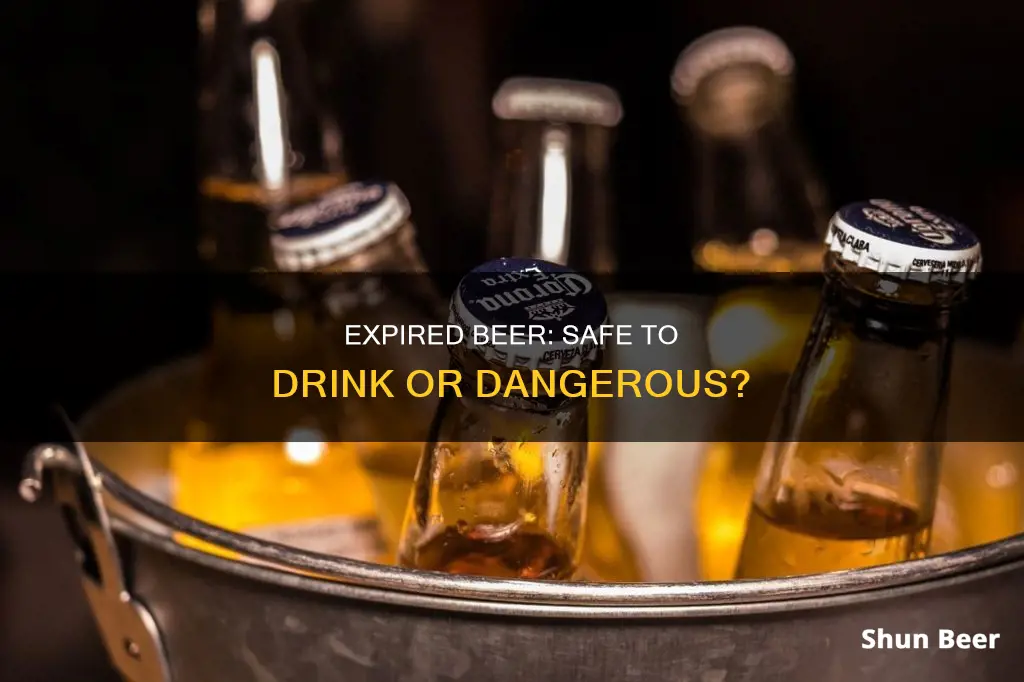
Beer is generally safe to drink after its expiration date, but it may not taste very nice. The flavour of hoppy beers like IPAs will start to fade shortly after their expiration date, while stronger, less hoppy beers will last longer. Beer with a higher alcohol content will also last longer. If stored in a refrigerator, beer can last up to two or three years past its expiration date, but it's best to finish an open beer within a day or two.
| Characteristics | Values |
|---|---|
| Will drinking past due beer make you sick? | In most cases, no. |
| How long can beer be consumed after its expiration date? | Beer can be consumed for several months or even longer after the expiration date. Refrigeration can extend this period to up to 2 years. |
| Does the type of beer matter? | Yes, stronger beers with higher ABV tend to last longer than lighter beers. Beers with low ABV can go bad in just 6 months. |
| How does light exposure affect beer? | Light exposure, especially UV rays, can cause beer to develop a skunky odour and taste. This is more prevalent in beers packaged in clear or green bottles. |
| How to store beer to prolong its lifespan? | Store beer in a cool, dark place, away from direct sunlight and extreme temperature fluctuations. |
| Can expired beer be used for cooking? | Yes, expired beer can be used in cooking or baking recipes that call for beer as an ingredient. |
What You'll Learn

Is drinking expired beer harmful?
In most cases, drinking beer that has passed its expiration date will not cause any serious harm. However, it is important to note that the taste, quality, and carbonation of the beer will likely deteriorate over time.
Beer Expiration and Safety
Beer does expire, and drinking expired beer will usually result in unpleasant tastes and aromas. However, it is unlikely to make you sick or cause any severe health issues. The low pH of beer prevents the growth of pathogens, making it safe to consume even after the expiration date.
Factors Affecting Beer Quality
The shelf life of beer depends on several factors, including the type of beer, storage conditions, and personal preference. Beers with higher alcohol content, such as stouts and lambics, tend to have a longer shelf life and can even improve with age. On the other hand, hoppy beers like IPAs are best consumed fresh, as the hop flavors tend to diminish over time.
Proper storage is crucial to maintaining beer quality. Beer should be stored in a cool, dark place, away from direct sunlight and extreme temperature fluctuations. Refrigeration can help slow down the aging process and extend the shelf life, but it does not guarantee indefinite freshness.
Signs of Spoilage
It is important to inspect the beer for any signs of spoilage before consumption. Signs of beer going bad include noticeable changes in taste, off-putting odors, a cloudy appearance, or excessive sediment at the bottom of the bottle. If the beer has been improperly stored or shows any of these signs, it is best to avoid consuming it.
Alternatives for Expired Beer
If you have expired beer that you do not want to consume, there are several alternatives. Expired beer can be used for cooking, as the alcohol content remains largely unaffected, although the flavor may differ. It can also be poured down the drain or repurposed for cleaning or fertilizing.
Organic Beer and Gout: Is It Safe to Drink?
You may want to see also

How long does beer last?
Beer does not technically expire or become unsafe to drink, even years after its "best before" date has passed. However, its taste will change over time. Beer is pasteurised during the brewing process, killing off any unwanted organisms. Once the beer is fully fermented, pathogens and bacteria cannot survive in the beer due to the combination of alcohol, low pH, and the antimicrobial activity of hops.
The flavour of beer will change over time due to oxidation, which occurs as a result of the tiny amount of oxygen left in the bottle, can, or keg interacting with the beer. Some beers will develop a stale, cardboard-like flavour, while more malt-forward beers can develop a sweet, bready, or toffee-like flavour. Beers with a high alcohol content, such as barley wines and imperial stouts, are sometimes brewed with the intention that they will be aged for a couple of years. However, most beers are brewed to be drunk fresh, and the general recommendation is to drink beer as soon as possible after it has been brewed.
The hoppiness and hop aromas of a beer will also dissipate with age. Hop aromas are time-sensitive, and an IPA that is three or four months old might not have the same hoppy aroma as a fresh IPA. Beers with a high alcohol content will hold their hops better, and beers with lower alcohol content should be consumed within 90-180 days. Beers that are not refrigerated should be consumed within four to six months.
Heat and light exposure can also cause beer to spoil more quickly. Heat speeds up the oxidation process, and beer should be kept out of direct sunlight to avoid a chemical reaction between ultraviolet light and certain hop compounds, which results in a skunky odour and taste.
Beer and Birth Control: Is It Safe to Mix?
You may want to see also

Beer storage
Beer does expire, but it is unlikely to make you sick. The flavour and quality will deteriorate over time, with low-gravity beers becoming stale more quickly than high-gravity beers. Beers with higher alcohol content, such as stouts and lambics, can age and improve in flavour over a few years if stored correctly.
To ensure optimal flavour and quality, beer should be stored in a cool, dark place, away from direct sunlight and extreme temperature fluctuations. A consistent temperature helps to slow down the deterioration process. Refrigeration can help to slow down the aging process and extend the shelf life of beer, but it does not guarantee indefinite freshness. Canned beer tends to last longer than bottled beer as cans do not let any light in, slowing down the oxidation process. Clear or green bottles are particularly susceptible to skunking and will oxidise rapidly.
Beer that has been opened should be finished within a few days, as exposure to oxygen can lead to oxidation, affecting the taste. Resealing can slow down this process, but it is best to consume opened beer within a day or two for optimal taste.
Flonase and Beer: Is It Safe to Mix?
You may want to see also

Signs of bad beer
Beer does expire, but it won't make you sick. The flavour and quality will degrade over time, however, and it's probably not worth drinking. Here are some signs that your beer has gone bad:
Bad aroma
A bad smell is usually the first sign that your beer has gone off. If it smells like a skunk, it's probably not a good idea to drink it. This is caused by exposure to UV rays and is more common in beers packaged in clear or green bottles.
No fizz
If your beer doesn't make the usual 'pssst' sound when you open it, it's probably gone flat and is no longer drinkable.
Excessive sediment
Sediment at the bottom of the bottle can indicate that a beer has gone bad.
Unusual taste
A stale, cardboard-like taste is a sign of early contact with oxygen, known as oxidation. This is common in kegs that have been left tapped for too long. Beer can also develop unusual flavours, such as cooked cabbage, sewage, sulphur, or an abnormally sour taste.
Diacetyl
Diacetyl is a buttery-flavoured compound that's produced in almost every beer fermentation. Exposure to too much diacetyl can be dangerous for your lungs, so it's best to avoid beers with a strong buttery or popcorn-like taste.
The Science of Nostalgia: Beer Cooler Edition
You may want to see also

What to do with expired beer?
Beer is generally safe to drink after its expiration date, but it may not taste very nice. Hop flavours will fade and off-flavours will develop over time. The flavour of hoppy beers such as IPAs will start to deteriorate shortly after their expiration date, while stronger, less hoppy beers will last longer.
If you have expired beer, you can drink it, cook with it, or use it for cleaning or fertilising. However, if the beer is very old, it's best to throw it away, as drinking it could result in temporary health issues such as nausea, vomiting, or a stomach ache.
If you're unsure whether your beer has expired, look out for signs such as a change in taste or the presence of off-putting odours. If the bottle or can is compromised, or if there is something strange floating in the beer, it's best to avoid drinking it.
Beer and Low-Iodine Diets: What You Need to Know
You may want to see also
Frequently asked questions
Yes, you can drink beer after its best-before date. The best-before date is a guideline on quality, rather than safety. You can still drink it after this date, but it won't taste as good.
A typical lager will be drinkable 6-24 months after its best-before date if kept in the fridge. That timeframe is 9 months if the beer hasn't been refrigerated. Beer stored in a cool, dark place will last longer.
You'll know if a beer has gone bad from the bad aroma, lack of fizzing sound, and poor foam when you open it. You could also look at the bottom of the bottle for excessive sediment, which could contribute to a poor taste.







